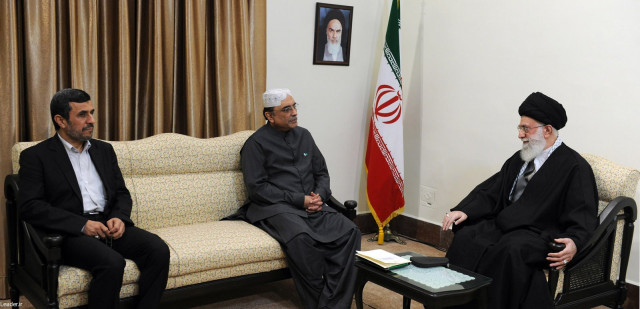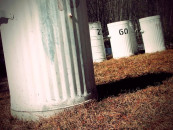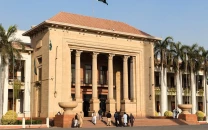Pakistan, Iran agree to vigorously pursue pipeline
Zardari proposes free trade agreement with Iran, easing visa restrictions.

A handout picture released by the official website of Iranian Supreme Leader Ayatollah Ali Khamenei shows Khamenei (R) talking with President Asif Ali Zardari and Iran's President Mahmoud Ahmadinejad (not in picture). PHOTO: AFP
The decision was taken at meetings between President Asif Ali Zardari, his delegation and Iranian authorities.
Iran for advancing on pipeline despite US pressure
Iran's supreme leader Ayatollah Ali Khamenei on Wednesday told the visiting Pakistani president that a much-delayed $7.5 billion gas pipeline project must go ahead despite US opposition.
"The Iran-Pakistan gas pipeline is an important example of Tehran-Islamabad cooperation, and despite hostilities towards the expansion of ties we must overcome this opposition decisively," Khamenei told Asif Ali Zardari, his office reported.
The gas pipeline project is strongly opposed by Tehran's archfoe Washington.
"Accessing safe energy source is the first priority for any country including Pakistan. In this region, the Islamic republic is the only nation that has safe energy resources and we are ready to provide Pakistan its energy needs," the all-powerful Khamenei said.
The pipeline project has run into repeated problems, including Pakistan's difficulty in finding funds and opposition to the project from Washington, which has slapped Iran with a raft of sanctions over its nuclear activities.
The Pakistani media reported last year that Zardari would visit Iran in mid-December 2012, when a final agreement was to have been signed, but the visit was delayed.
In 2010, Iran and Pakistan agreed that Tehran would supply between 750 million cubic feet (21 million cubic metres) and one billion cubic feet per day of natural gas by mid-2015.
Iranian President Mahmoud Ahmadinejad told Zardari that, "building the gas pipeline between Iran and Pakistan is a great and important event, and it serves the two nations' interests," the president's office reported.
"I believe that building this project is very beneficial for both sides and we support all the work carried out so far," Zardari said in talks his Iranian counterpart.
"The international and regional players have tried in vain to prevent an expansion of Iran-Pakistan ties but the people have learnt how to act against enemies of Islam," he was quoted as saying.
Islamabad has said it will pursue the project regardless of US pressure, saying the gas is needed to help Pakistan overcome its energy crisis that has led to debilitating blackouts and suffocated industry.
Iran has almost completed the pipeline work in its territory, but Pakistan has not yet started construction of 780 kilometers (490 miles) of the pipeline on its side, which is said to cost some $1.5 billion.
Sanctions-hit Iran finally agreed to finance one third of the costs of laying the pipeline through Pakistani territory to Nawabshah, north of Karachi, with the work to be carried out by an Iranian company.
Pakistani officials in mid-December said Iran had promised a $500 million loan and that Islamabad would meet the rest of the cost.
"There are impediments in view of the US opposition to the project but we are determined to complete it to meet our fast-growing energy requirements," said one government official on condition of anonymity.
Tehran has been strangled by a Western oil embargo that has seen its crude exports halve in the past year, while Pakistan has an acute need for energy and plans to produce 20 percent of its electricity from Iranian gas.
Iran has the second largest world gas reserves after Russia and currently produces some 600 million cubic metres a day, almost all of which is consumed domestically due to lack of exports means.
Pakistan for free trade with Iran
President Asif Ali Zardari and President Mahmoud Ahmadinejad on Wednesday decided to vigorously pursue the Iran-Pakistan gas pipeline project as well as other mega projects between the two countries.
Spokesperson Senator Farhatullah Babar said that the decision was taken during two rounds of meetings between the two leaders, one at the delegation level and the other at a one-on-one meeting when they underscored the need to take full advantage of each others' resources and expertise.
While highlighting need for greater trade President Zardari a proposed free trade agreement between Pakistan and Iran, an easing of visa restrictions and revisiting the tariff and non-tariff trade barriers.
President Zardari said that the two countries together with Turkey could provide fresh impetus to the Economic Trade Organisation that would further strengthen bonds among the people and also promote trade and socio-economic development in the region.
The only foreign client is Turkey, which buys about 30 million cubic metres of gas a day.
Tehran also plans to sell its gas to two other neighbours, Iraq and Syria. The three countries agreed in 2011 to build a pipeline, with the work already started on the Iranian side.



















COMMENTS
Comments are moderated and generally will be posted if they are on-topic and not abusive.
For more information, please see our Comments FAQ